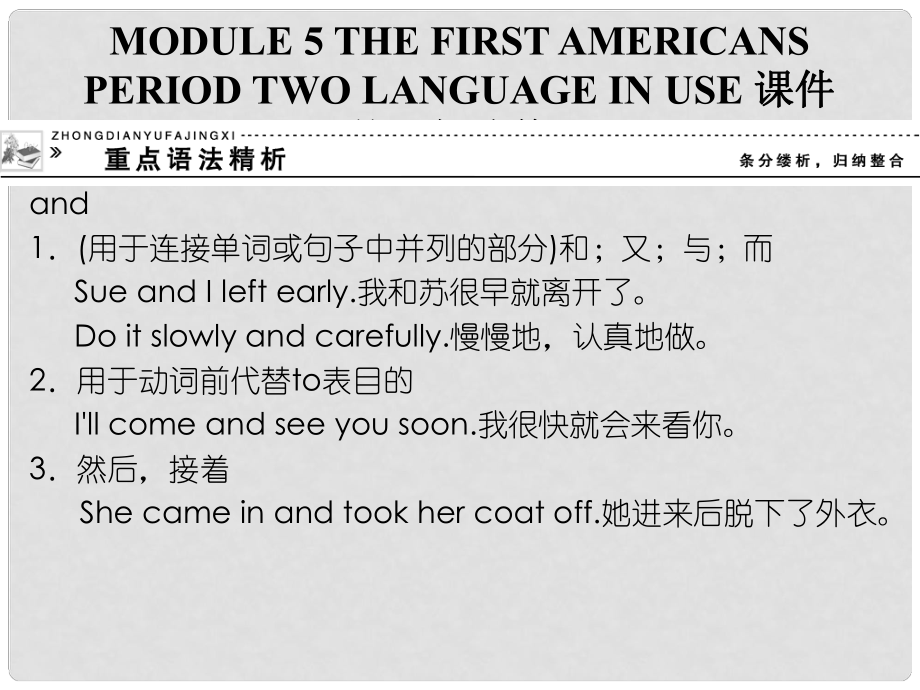《高中英語(yǔ) Module 5 The First Americans Period Two Language in Use課件 外研版選修9》由會(huì)員分享��,可在線閱讀���,更多相關(guān)《高中英語(yǔ) Module 5 The First Americans Period Two Language in Use課件 外研版選修9(17頁(yè)珍藏版)》請(qǐng)?jiān)谘b配圖網(wǎng)上搜索�。
1��、and1(用于連接單詞或句子中并列的部分)和����;又���;與���;而Sue and I left early.我和蘇很早就離開了�����。Do it slowly and carefully.慢慢地���,認(rèn)真地做。2用于動(dòng)詞前代替to表目的Ill come and see you soon.我很快就會(huì)來(lái)看你�。3然后,接著She came in and took her coat off.她進(jìn)來(lái)后脫下了外衣�����。MODULE 5 THE FIRST AMERICANS PERIOD TWO LANGUAGE IN USE 課件課件(外研版選修(外研版選修9)4(引出說(shuō)話或提問(wèn))那么�,于是We talked for hour
2、s.我們談了好幾個(gè)小時(shí)����。And what did you decide?那么你們作出了什么決定�����?5(連接相同的詞表反復(fù)或連續(xù))接連�����,又,愈來(lái)愈The pain is getting worse and worse.疼痛越來(lái)越厲害了�����。He tried and tried but without success.他反復(fù)嘗試�,但沒有成功。6(連接兩個(gè)句子�����,后者表結(jié)果)那么Go straight and youll see a high building on your left.直走�����,你就會(huì)看見有一幢高樓在你左邊����。any1(與不可數(shù)名詞或復(fù)數(shù)名詞連用,用于否定句����、疑問(wèn)句以及if或whether之后)
3、任何的�����,任一的Are there any stamps in the drawer��?抽屜里有郵票嗎����?You cant go out without any shoes.你不能不穿鞋就出門。2(與單數(shù)可數(shù)名詞連用)任一Take any book you like.喜歡哪本你就拿哪本��。3代詞(用于否定句��、疑問(wèn)句或if��,whether之后)任何數(shù)量Please tell me how many people are coming, if any.請(qǐng)告訴我�����,如果有人要來(lái)的話���,有多少���。4(代詞)任一,任何一些Which colour do you want�����?你要哪種顏色?Any of them will
4�����、 do.隨便哪種都行����。5adv.(用于否定句�����、疑問(wèn)句�,加強(qiáng)形容詞或副詞的語(yǔ)氣)一點(diǎn)也(不),完全(不)���,絲毫He wasnt any good at French.他的法語(yǔ)糟透了��。I cant run any faster.我不能跑得更快了����。can1表能力�,意為“能夠”�。He can swim three laps in the pool.他能在游泳池游三趟���。2表許可( can may,cantmustnt) You can take the book if you like it.如果你喜歡這本書�,可以拿走。3表示推測(cè)���,意為“可能”�����。指現(xiàn)在用“can原形”����,指過(guò)去用“can have don
5�����、e”�。He can not have done such a thing.他不可能做這種事。習(xí)慣用語(yǔ):cannot but do不得不I cannot but admire his courage.我不得不佩服他的勇氣���。cannot help doing禁不住I cannot help laughing.我禁不住大笑���。come1來(lái)Here comes the bus! (The bus is coming���!) 公共汽車來(lái)了!2come ( to)抵達(dá)(某地)�,來(lái)到Y(jié)our breakfast is coming soon.你的早餐很快就到。3come for/about/to do sth來(lái)拿
6��、�����,來(lái)取��,來(lái)做Ive come for my book.Ive come to get my book.我來(lái)拿我的書����。1come about發(fā)生Can you tell me how the accident came about?你能告訴我事故是怎么發(fā)生的嗎?2come across (come over) 被理解��;給人印象��;偶然遇見She comes across well in interviews.她在面試中常給人留下很好的印象��。She came across some old photos in a drawer.她在抽屜里偶然發(fā)現(xiàn)了一些舊照片。常用短語(yǔ)常用短語(yǔ) 3come after
7��、 (run after) 追趕4come along 進(jìn)展��;跟隨�;趕快Im glad you came along.有你跟我一起來(lái),我很高興�����。Your French has come along a lot recently.你的法語(yǔ)最近進(jìn)步很大�����。5come to恢復(fù)知覺6come around (round) to(短暫)訪問(wèn)Do come around and see us some time.務(wù)必抽空來(lái)看看我們��。7come from來(lái)自(不用于進(jìn)行時(shí))8come back to sb恢復(fù)記憶�,回想起come back to sth回到上來(lái)Its all coming back to me
8��、 now.現(xiàn)在我全都回想起來(lái)了�����。Its all comes back to a question of money.一切又回到錢的問(wèn)題上來(lái)了�����。9come on/upon偶然遇見10come out出現(xiàn);盛開���;出版���;為人所知on1表時(shí)間(用于星期、日期或特定的早上����、晚上、上午�、下午等)。on the evening of 11th在十一日的傍晚I will show you the book on my return.在我回來(lái)的時(shí)候���,我會(huì)讓你看那本書�。on this occasion在此場(chǎng)合2表示地方或位置�����,意為“在上面”����。There is a map hanging on the wall.有
9����、一幅地圖掛在墻上����。例外:in Europe/in the field在歐洲/在田野里3表示在江、河�、湖、海之濱���。London is on the Thames.倫敦位于泰晤士河畔�。4表示“關(guān)于�����、論及”���,等同于about,concerning���。He has written a lot of books on the history of China.他寫了很多有關(guān)中國(guó)歷史的書�。5表示“為的一分子”��,相當(dāng)于as a member of。 Who is on the committee? 誰(shuí)在此委員會(huì)中���?6表示“支撐��,依靠�,以為生”�����,可換用upon����。That depends on circumsta
10、nces.那要視情形而定����。depend on/count on/rely on/rest on依靠7在狀態(tài)或情況中on fire/on show/on leave在著火/在上演/在休假when1adv.(疑問(wèn)句中)什么時(shí)候When did you last see him? 你最后一次見他是什么時(shí)候?2(作關(guān)系副詞時(shí)���,用于所表達(dá)的時(shí)間之后)在那時(shí)Sunday is the only day when I can relax.星期日是我唯一可以休息的日子�。3pron.何時(shí)Until when can you stay�����?你可以待到什么時(shí)候?4adv.當(dāng)時(shí)The last time I went to Scotland was in May, when the weather was beautiful.上次我去蘇格蘭是在五月份����,當(dāng)時(shí)天氣很好。5conj.當(dāng)時(shí)I loved history when I was at school.當(dāng)我在學(xué)校讀書時(shí)�,我喜歡歷史。6conj.就在時(shí)候I was about to go when the phone rang.我正要走�,就在這個(gè)時(shí)候電話響了。7conj.雖然����,然而She claimed to be 18,when I know shes only 16.雖然她聲稱有18歲�����,但我知道她只有16歲����。
 高中英語(yǔ) Module 5 The First Americans Period Two Language in Use課件 外研版選修9
高中英語(yǔ) Module 5 The First Americans Period Two Language in Use課件 外研版選修9

